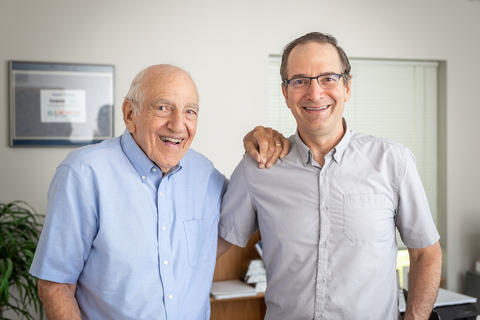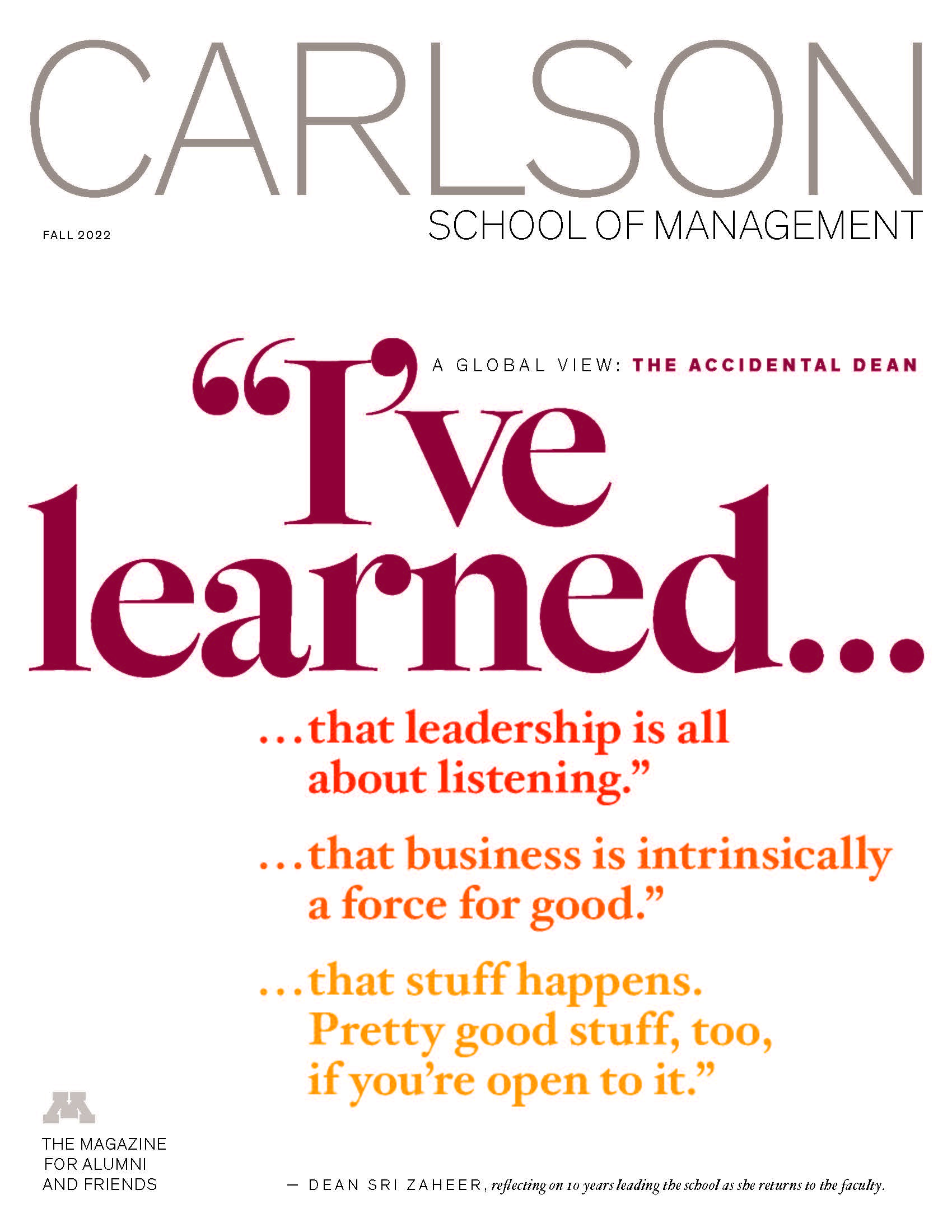
Alum Mark Paper Reaches 60-year Milestone as CEO
Friday, October 14, 2022
BY SARAH ASP OLSON
Mark Paper, ’54 BSB, has led his family business, Lewis Bolt & Nut, for the past six decades—and he shows no signs of slowing down.
When you’ve run a successful company for as long as Mark Paper has, you tend to get asked for advice. There are three things Paper tells people when they inquire about his successful 60-year career as CEO of Lewis Bolt & Nut, a company that manufactures fasteners for the railroad industry: “Believe in yourself, maintain a sense of humor (including the ability to laugh at yourself), and seek advice from others.”
There’s a caveat to that last one that may be the most important key to Paper’s six-decade CEO success story: Leaders need to listen, but taking others’ advice is optional. “You know best what to do,” says Paper.
The Family Business
Indian Bolt was started in 1921 by the Northern Pacific Railroad. The company had six employees who manufactured a single bolt used to repair railroad cars. Paper’s uncle purchased the company in 1927 and renamed it after his father, Lewis—who was Mark’s grandfather. “
My dad joined in about 1935,” says Paper. “He separated from his two brothers around 1940 and it’s been in our family ever since.”
Paper graduated cum laude from the University of Minnesota Business School in 1954 and worked for Lewis Bolt off and on. As the 1950s came to a close, Paper’s father was having health issues and the business was floundering. Mark, a self-described “brash” 28-year-old who often found himself in leadership positions in sports or school, saw an opportunity to turn the company around.
“When he was on vacation in Florida, I called up my dad and I said, ‘Dad, I think I can run the business better than you,’” Paper recalls. “And he said, ‘OK.’”
So, in 1962, a not yet 30-year-old Mark took over as president. Six decades later, he’s still there.
Learning to Lead
Looking back over his early years in charge, Paper can pinpoint a few qualities that he came by naturally and that have served him well over the years. The first is trust.
“I understood leadership, and how you have to build a team,” he says. “You have to build trust. You have to be honest and fair.”
The second was his commitment not to let fear run the show.
After his dad stepped down, Paper reacted against what he saw as a culture of fear within the organization. He worked to build trust with his employees and allowed them to fail without fear of retaliation. He trusted them to learn from their mistakes and use them to get better.
These principles continue to be at the heart of Lewis Bolt.
“You can’t work for Mark unless he trusts you completely,” says Cheryl McIntosh, Lewis Bolt’s chief financial officer and a 30-year veteran of the company. “By trusting you completely he allows you to manage your responsibilities without fear of making mistakes, and without someone watching over your shoulder. This breeds creativity and loyalty. … We all make mistakes but if our intentions are good, he knows it and gives a lot of grace.”
I understood leadership, and how you have to build a team. You have to build trust. You have to be honest and fair.
The Hard Years
You don’t lead a company for 60 years without going through some tough times. According to the company’s history online, the 1980s was the most difficult decade, not just for Lewis Bolt, but for the entire industry. The decade saw about 50 percent of the country’s fastener manufacturers go out of business due to debt, overcapacity, and market growth outside of the United States.
“Lewis reflected the effects of what was happening nationally,” a history of the company states on its website. “The company’s net worth dropped substantially, its customers and markets changed dramatically, and its sales volume decreased.”
By 1989, “we were near the point of going under,” Paper recalls.
Several things happened as the ’80s gave way to the ’90s that pulled Lewis Bolt back from the edge of ruin. First, the company pivoted and withdrew from wholesale hardware distribution in favor of seeking new customers for its own products outside of the rail industry.
The second came in the form of two additions to the team: Mark’s son, Tom Paper, who joined in 1991 and soon became president in charge of operations, and Dave Barry, who arrived the same year as vice president of sales—an addition Mark credits with turning the whole company around.
In the ensuing years, Lewis Bolt went from doing between $3 to $4 million in annual sales to around $75 million in sales.
“[Dave] is the one that’s responsible for that the most,” says Paper. “The only credit I get is that I hired him.”
Barry still works for Lewis Bolt. He considers Paper to be like a second father to him, and he’s learned a lot about leadership from his time under the 60-year CEO. “Mark is an incredibly good listener and so good at analyzing situations and giving it back to the employee to figure out what the solution to an issue is,” says Barry. “He likes to empower people to take chances and not be afraid to fail.”
The Big Move
The ’90s were most definitely growing years for Lewis Bolt. The company was leaning into new opportunities and at the same time outgrowing their Minnesota home.
“The financial outlook for the company had been weak for several years,” the company history reads. “The company was hampered by an outdated plant layout, restrictive work rules, excessive employee wages and the absence of adequate training, quality control, preventive maintenance and continuous improvement programs. Tom and Mark tried without success to devise a way to keep the manufacturing facility in Minneapolis and survive.”
In 1992 the Papers and their team decided the only way to survive was to move operations out of Minnesota. The search led them to La Junta, Colorado, which became a true partner for Lewis Bolt—refinancing the company debt and constructing a new building to lease back to Lewis.
You don't see that in every company. That's a mindset that we started a long time ago— that getting better is part of our DNA.
The move has paid off for Lewis Bolt. Since setting up operations in La Junta in 1993, it has grown from eight employees to more than 300. Operations have also expanded from the initial 28,000-square-foot facility to about 150,000 square feet.
“The people in La Junta were amazing,” says Tom. “We could tell that we were really going to be important to them and they were important to us. That was a really wonderful marriage and it’s been great ever since.”
Tom left the business in 1997 to pursue a career in consulting.
“The business went through some very challenging times,” he says. “My dad didn’t demonstrate a lot of fear during that time, and I think he kept his head about him. … He’s always had an adventurous spirit.”
Always Innovating
The new millennium brought growth for Lewis Bolt. In addition to record growth in sales, workforce, and physical space, the company has developed products that have helped establish it as a leader among suppliers to the rail and transportation industries.
“Lewis Bolt is a very innovative company,” says Tom. “We work hard to develop new products for our customers [primarily the rail industry] that help them carry more weight or go at faster speeds.”
Lewis Bolt’s first patent was registered in 1936; today the company holds nine active patents in the U.S., Canada, and Mexico.
“That only happens because the people in the organization listen to the customers and then try to do things differently,” says Tom. “You don’t see that in every company. That’s a mindset that we started a long time ago—that getting better is part of our DNA.”
Lewis Bolt's Next Chapter
At 89 years old, Mark Paper is still hands-on in his leadership of Lewis Bolt, but the “hard work,” as he calls it, is being done by his operations team that includes Dave Barry, Cheryl McIntosh, and her husband, Brett, who is the operations manager. Of course, he’s thought about stepping down, but for now he’d rather be working than retired.
“I love what I’m doing and it’s working well,” he says. “I’ve got a good thing going at the moment. I will step down [and] I’m assuming I will … know when the time is right.”
When the time comes for Mark to step down, Tom—who already owns the majority of non-voting stock in the company—will take over for his father as CEO of Lewis Bolt. The succession plan is in place and both Papers are committed to keeping the business in the family.
“My dad is going to keep going and as long as he’s able,” says Tom. “I’ll step in when the time comes, and we’ll just keep going. Mark and I have talked about this, I’ve talked about it with Dave and Cheryl and Brett—the three leaders of the company—and our intent is to keep it as a family business.”
As for Mark, eventually he will hand over the reins to Lewis Bolt & Nut, but he knows it will be in good hands. And he’s proud of the legacy he’s able to pass down to the next generations of Papers.
“My hope is that the company will stay on as a family company for the next 60 years,” he says. “That’s important to me.”


